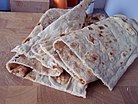food.wikisort.org - Dish
Podpłomyk (Polish: plural: podpłomyki; German: fladen; Ukrainian: перепічка, perepichka, підпалок, pidpalok) is a simple kind of flat bread, often made without yeast.
| Type | Flatbread |
|---|---|
| Place of origin | Poland |
| Main ingredients | Flour, water, salt |
This article does not cite any sources. (December 2009) |
Podpłomyk was a common kind of food in ancient Slavic societies, where it was made on stones heated up in a fire. Podpłomyki were also made in newer times by those who could not afford an enclosed stove. Before the mid-19th century, many poor Polish peasant homes had only open fireplaces, and the "thick" bread required careful heating in an oven; to overcome the problem, such ovens were sometimes communally-owned. Now podpłomyk, actually having never fully disappeared, has become popular again due to the interest in (pre-) medieval everyday life. Made of flour, water and salt, podpłomyki are often eaten with honey or "konfitury" (a kind of jam). Sometimes a podpłomyk was made to test the temperature of the baker's oven before the first batch of bread was made.
Другой контент может иметь иную лицензию. Перед использованием материалов сайта WikiSort.org внимательно изучите правила лицензирования конкретных элементов наполнения сайта.
WikiSort.org - проект по пересортировке и дополнению контента Википедии
